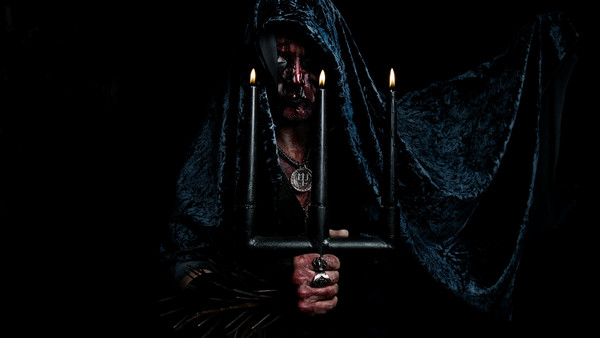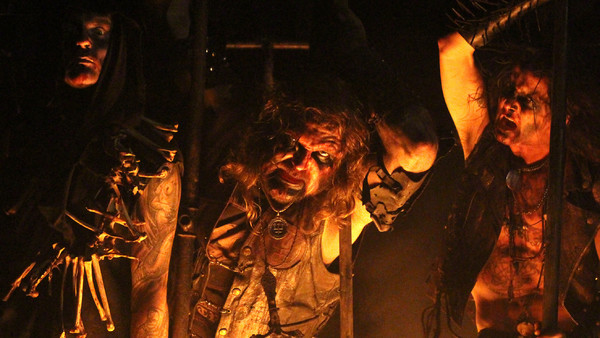Watain Interview: Fire, Black Metal & Trident Wolf Eclipse
“The abomination that is the mother of black metal should definitely be feared by common men.”

From its very origins, black metal has been a genre built on danger, evil and subversion. From the infamous acts of Mayhem and Varg Vikernes in early-‘90s Norway to the modern-day world of Marduk drawing ire from antifascist groups, threat and controversy have always been the lifeblood of heavy music’s most raw and abrasive style.
In the 2010s – an era dominated by tamer, post-blackened groups like Deafheaven and Ghost Bath – Watain are keeping the faith, proudly surrounding themselves with unhallowed imagery and lyrics constantly. Over the course of the power trio’s twenty-year career, their live show has become legendary, with photos of the face-painted Swedish stalwarts sharing a stage with flaming tridents, dead animals and dismembered limbs common, yet always enthralling.
When I got to catch up with Watain’s enigmatic leader, Erik Danielsson, the band were preparing for a live set tailor-made for their riotous, unsettling presence. They were resting on the precipice of a late-night headlining slot at the UK’s most extreme metal festival, Bloodstock, with an appropriately late billing that wouldn’t see them cease their satanic rituals until the stroke of midnight.
In anticipation for this impending congregation, Erik and I speak about danger, fire and black metal, as well as the incendiary new album Trident Wolf Eclipse.
Matt Mills: “A lot of people hear the term ‘black metal’ and think of different things: some people think of controversy and danger, others think of Norway and others just think of really, really good music. When you hear the term ‘black metal’, what are the first things to enter your head?”
Erik Danielsson: “To a certain extent, yes, all of those things are included in the contemporary idea of black metal, but, for me, I come from a time when black metal was something radically different and meant something radically different from what it does now. I come from a time when black metal was about life and death, about stabbings, about arson, about extremely potent powers and beliefs that most people of today, if they knew about them, would run away in fear from. And my vision of that hasn’t really changed at all. It’s still exactly that to me. I consider it a sacred cult to which I have devoted a large part of my life and Watain is the vessel of that.”
“Do you think black metal is something that should be feared?”
“Black metal in the true sense of the word, yes, absolutely. Black metal as the entertainment industry that most people know it for, no. Why? There’s no reason to fear that at all. But the heart of black metal, the abomination that is the mother of black metal, should definitely be feared by common men.”
“Now we’re in this era of bands that consider themselves to be ‘post-black metal’: bands like Deafheaven and Wolves in the Throne Room. Do those bands, in your eyes, deserve to be called black metal?”
“I don’t give a f—k about those bands or anything that they do. I really don’t. My heart beats for other things than what they do. There will always be misinterpretations and vain misconceptions and takes on black metal. I don’t care about any of that stuff at all.”
“Is your goal with Watain to make people go ‘I’m scared by Watain. They terrify me!’?”
“No, the goal is to do something onstage that resonates completely with the music and the lyrics. It all has to represent the same force, it has to be directed towards the same point of focus and it should all represent the same thing.”

“How long did it take the band to perfect the very intense and elaborate live show that you have?”
“I would say that’s very much an ongoing process. It has been for the past twenty years, I would say. It’s always about refining and about getting closer to perfecting what I was just saying about the stage show having to resonate seamlessly with the music. That’s an art form in itself: it’s craftsmanship, it’s spiritual work, there’s a lot to that. And I think that’s one of the things that motivates us a lot these days: to understand that we brought this so much further than we could ever imagine, but we still have heaps of ground left to cover.”
“I’m imagining when Watain were first starting out in late-‘90s and early-2000s Sweden, you didn’t have the room or the budget for all the immense fire and pyro that you have now. So what other measures did you take to achieve that same effect?”
“There was a lot of experimenting going on. What is similar now compared to what we were doing back then is that we’re still building all the stuff on our own. It is done by our own hands. But, back then, it was sitting in one of the members’ garages and nailing pieces of wood together into crosses, while now it’s a bit more elaborate than that. But it’s always been a matter of wanting to be hands-on with the material, because these things that we have onstage are sacred to us. They need to originate from a source that is pure and has the right intention from the start.”
“And obviously you’re still touring to promote the new album, Trident Wolf Eclipse, which came out earlier this year. It’s a very brutal and intense record, yet also melodic in some places. Were you conscious of those melodies when you were writing the songs? Did you want them to be quite melodic?”
“No, I wouldn’t say that. I’d rather say that we knew that what part of Watain we wanted to emphasise with this record. We were focusing on the more savage and predatory nature of the band, I would say: something that actually has a lot to do with playing live a lot, that side has always come forward a bit more. So we wanted to take that into the creative process a lot. There will always be melody in Watain. We’ve never been a primitive, two-chord band. There’s always been a lot of Swedish tradition in our music and, for me, Trident Wolf Eclipse was perfect in that regard because you could combine something extremely savage and hostile together with a more classic heavy metal, melodic element.”
Trident Wolf Eclipse is out now via Century Media Records. Read more about it in our “20 Best Metal Albums of 2018 (So Far)” list.
Read more about this year’s Bloodstock Festival in our “10 Things We Learnt at Bloodstock 2018” list.